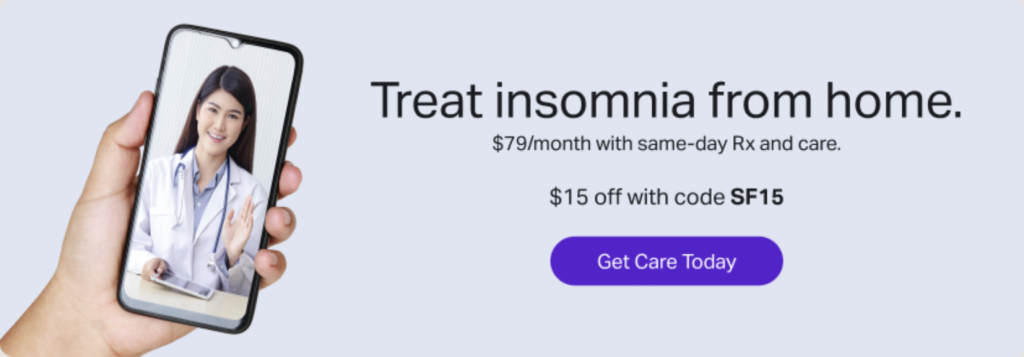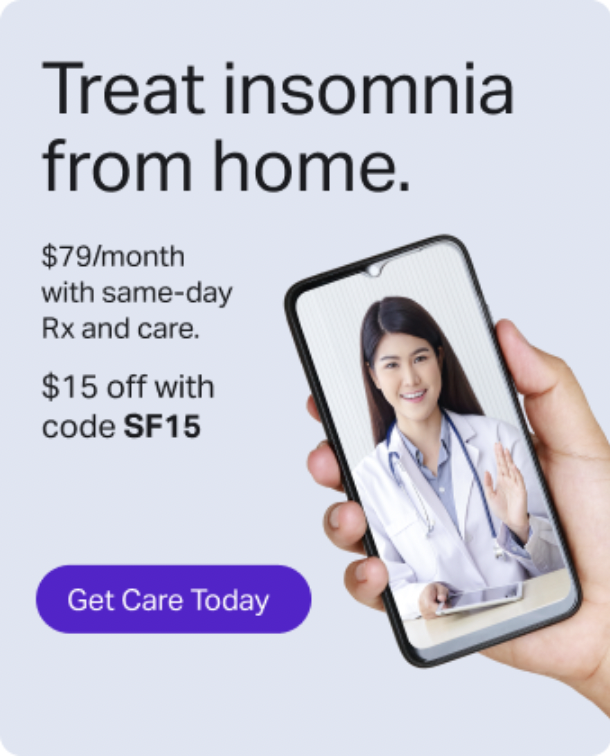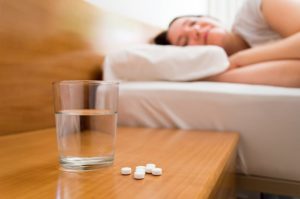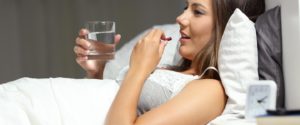When you buy through our links, we may earn a commission. Products or services may be offered by an affiliated entity. Learn more.
Compare Sleep Aids
Sleeping problems are commonplace in America an estimated 35% of adults failing to get the recommended amount of sleep per night. To try to get better rest, many people take sleep aids, which include prescription drugs, over-the-counter medications, and dietary supplements.
More than 8% of adults say that they used a sleep aid multiple times in the previous week. With so many types of medications available, many people struggle to compare sleep aids and know which can best help them sleep.
Ultimately, every sleep aid offers potential benefits and poses certain risks. To help you better understand your options, we take an in-depth look at the different types of sleep aids and how they work. With this information, you can talk with your doctor to identify the best sleep aid in your case and ensure that you take it safely.
How Do You Pick the Best Sleep Aid For You?
Working closely with your doctor is the best way to compare and pick a sleep aid. A health professional can recommend the best sleep medication for your situation, accounting for factors including:
- The symptoms and cause of your sleeping problems
- Your age and overall health including other medical conditions
- Other medications that you take
Whether you’re considering prescription drugs, over-the-counter medications, or dietary supplements, your doctor can explain the potential benefits and risks and help make sure that you take the right dosage at the right time of night.
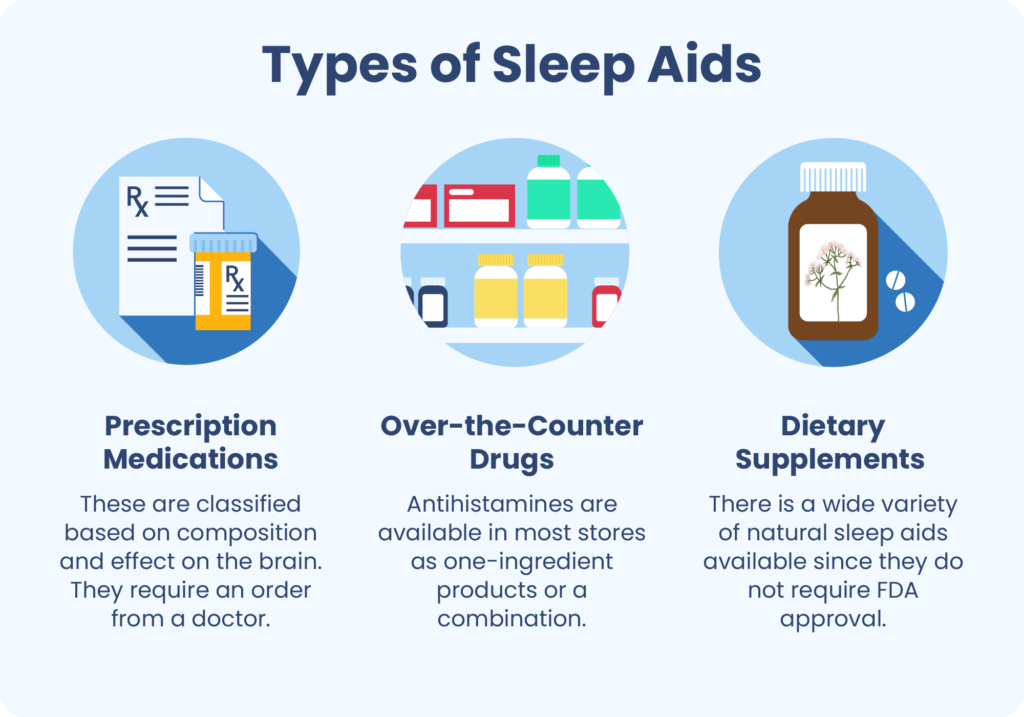
In some cases, the best sleep aid may not be a medicine at all. Non-drug treatments such as a type of counseling called cognitive behavioral therapy for insomnia (CBT-I) or a focus on developing healthy sleep habits can often make it easier to get to sleep. These approaches may be combined with medications as part of a plan to get better sleep over the long-term without relying on sleep aids.
Prescription Sleep Aids for Insomnia
Prescription sleep medications are only available from a pharmacy, and to obtain them you must have a prescription from your doctor.
Insomnia occurs when a person can’t fall asleep or stay asleep even when they have the chance to do so. It is the most common sleep disorder, and many prescription sleep aids are designed to treat insomnia.
Several kinds of drugs may be used. While they are chemically different, they have many similar effects and potential side effects.
Z Drugs
Z drugs are a type of sedative-hypnotic medication that makes people feel sleepy. The drug names feature the letter Z, which is how they derive this informal name.
Specific Z Drugs Approved To Treat Insomnia: Zolpidem, eszopiclone, zaleplon
Indicated Usage: Z drugs are approved by the FDA for short-term therapy for insomnia. Some Z drugs can help with both getting to sleep and sleeping through the night, but others are only recommended by the American Academy of Sleep Medicine (AASM) for help falling asleep.
Side Effects and Precautions
- Daytime drowsiness: Some people report lingering effects on mental function that last into the next day. This may cause drowsiness or slowed thinking and can pose risks for activities like driving.
- Cognitive impairment: In addition to making someone sleepy, Z drugs can cause loss of balance and reduced mental alertness, which may make someone prone to falls or other inadvertent injury.
- Dependence: People can become addicted to Z drugs, leading them to take them for longer or at higher doses than indicated.
- Withdrawal: Suddenly stopping taking Z drugs can cause withdrawal symptoms including worsened sleep as well as physical effects, impaired thinking, and mood changes.
- Abnormal thinking and behavior: Some people engage in odd behavior while partially asleep after they have taken Z drugs. Some of these behaviors, such as trying to drive a car, can be dangerous.
- Worsening of depression: Some people with depression find that their symptoms are worse when taking Z drugs.
- Allergic reaction: These reactions are rare, but when they do occur, they can be serious and induce anaphylaxis.
Who Shouldn’t Use Z Drugs
When taken at the proper timing and dosage, Z drugs are safe for most people. Older adults who are at higher risk of falls should use caution before taking Z drugs.
Studies have found that women are frequently more affected than men by the same dose of these drugs, increasing the risks of next-day impairment. Anyone taking Z drugs should inform their doctor if they have any lasting effects of these drugs in the morning.
These sleep aids should not be combined with other sedatives, like alcohol, opiates, or benzodiazepines. This can lead to worsening respiratory function.
Orexin Receptor Antagonists
Orexin receptor antagonists are a newer class of drugs that induce sleep by affecting the sleep-wake cycle. They accomplish this by decreasing production of orexin, a chemical in the brain that causes alertness.
Specific Orexin Receptor Antagonists Approved To Treat Insomnia:Suvorexant, lemborexant
Indicated Usage: Orexin receptor antagonists are approved by the FDA for the treatment of insomnia related to both sleep onset and sleep maintenance. The AASM, though, has not recommended these drugs for help with falling asleep.
When AASM recommendations were published in 2017, they did not mention lemborexant, which was not approved by the FDA until late 2019. Although AASM does not have a recommendation for or against lemborexant, recent studies indicate that it may help with both sleep onset and sleep maintenance.
Side Effects and Precautions
- Daytime drowsiness: The sleepiness from orexin receptor antagonists may persist until the next day, which can be problematic for operating a motor vehicle or heavy machinery.
- Cognitive impairment: Dramatic reductions in alertness may affect balance or thinking, heightening the risk of accidental injuries and falls.
- Dependence: Taking orexin receptor agonists can be habit-forming, and there is a risk of abuse of these medications.
- Withdrawal: Insomnia symptoms may quickly return if you suddenly stop taking orexin receptor antagonists.
- Abnormal thinking and behavior: Strange actions taken while partially asleep can occur after taking orexin receptor antagonists. These actions may be benign or dangerous, such as attempting to drive a car.
- Worsening of depression: Some people who have mood disorders find that their symptoms can get worse with orexin receptor antagonists.
- Allergic reaction: Very few people have allergies to these drugs, but an adverse reaction is possible.
Who Shouldn’t Use Orexin Receptor Antagonists
When taken for the prescribed length of time and at the right dosage, these drugs are typically safe for healthy adults. Older adults and people at risk of falls should take these sleep aids with caution.
Melatonin Receptor Agonist
Melatonin receptor agonists are drugs that activate the melatonin receptors in the body. Melatonin helps the body regulate its internal clock, also known as its circadian rhythm.
Specific Melatonin Receptor Agonists Approved To Treat Insomnia: Ramelteon
Indicated Usage: Ramelteon is approved by the FDA to treat insomnia related to initially falling asleep.
Side Effects and Precautions
Ramelteon is generally well tolerated. While it can cause some similar side effects, the risk is generally lower than with other prescription sleep medications.
- Daytime drowsiness: The effects of ramelteon may last into the next day. Reduced alertness can elevate the risk of car crashes or other accidents.
- Cognitive impairment: Thinking may be slowed after taking ramelteon. It can also affect coordination, potentially contributing to the risk of falls or other injuries.
- Abnormal thinking and behavior: Although less common than in some other sleep medications, some people may engage in strange behavior, such as sleepwalking or trying to drive their car while partially asleep.
- Worsening of depression: Certain people who have depression may find that their symptoms are worse with Ramelteon.
- Allergic reaction: Although uncommon, it is possible to have an acute allergic reaction to ramelteon.
Who Shouldn’t Use Melatonin Receptor Agonists
Most people can use ramelteon safely. It should not be used by people with sleep maintenance insomnia and should be used with caution in people who have other health conditions that could be affected by this drug.
Benzodiazepines
Benzodiazepines are sedative-hypnotic drugs that work by slowing brain activity to help make you sleepy. These drugs were among the earliest prescription medications for insomnia, but newer drugs are now more likely to be used as an initial therapy. Sometimes called “benzos” for short, benzodiazepines may also be used for anxiety disorders, seizures, procedural sedation, and alcohol withdrawal.
Specific Benzodiazepines Approved To Treat Insomnia:Temazepam , triazolam , estazolam , quazepam , flurazepam
Indicated Usage: Benzodiazepines are approved for short-term use , generally lasting 7-10 days, to treat insomnia. The AASM recommends some benzodiazepines only to help fall asleep while others may help fall asleep and stay asleep.
Side Effects and Precautions
- Breathing problems: Benzodiazepines can impair breathing and carry a special warning from the FDA about potentially life-threatening dangers when using these medications along with sedatives like opioids and alcohol.
- Daytime drowsiness: Some people find that they are still groggy the day after taking benzodiazepines. These drugs can remain in your system for many hours, which may lead to a lasting effect, especially at higher dosages. Daytime drowsiness may affect mental function and reaction time, posing particular risks for driving or operating heavy machinery.
- Cognitive impairment: Benzodiazepines can affect thinking and may make people feel dizzy or confused. This can raise the risk of accidents or falls.
- Dependence: These drugs are habit-forming, which means that you can become addicted to them.
- Withdrawal: When you stop taking benzodiazepines, sleep problems may recur or get worse. Physical, cognitive, and emotional effects may arise if you stop taking these drugs abruptly. In more severe cases, withdrawal can lead to seizures and, in some cases, death.
- Abnormal thinking and behavior: Sedative-hypnotics like benzodiazepines can cause strange thoughts or behaviors, including hallucinations or even complex behaviors like sleepwalking or trying to drive while partly asleep.
- Worsening of depression: Some people may experience a worsening of symptoms of depression when taking benzodiazepines.
- Allergic reaction: Though rare, some people have severe allergic reactions that can cause rash, shortness of breath, or anaphylaxis.
Who Shouldn’t Use Benzodiazepines
Benzodiazepines are generally not recommended for older adults because of the risk of cognitive impairments and an increased risk of accidents and falls.
Because of their potential effect on breathing, benzodiazepines are less often used in people who have obstructive sleep apnea. Benzodiazepines should not be used by patients who are also taking opioid drugs or other sedatives.
Antidepressants
Antidepressants treat the mood disorder depression. Because these medications can have a sedative effect, they have also been used as sleep aids.
Specific Antidepressants Approved To Treat Insomnia:Doxepin , Trazadone
Indicated Usage: Only one antidepressant has been approved by the FDA specifically for insomnia, and the AASM recommends its use only for helping people stay asleep through the night.
While the AASM does not recommend any other antidepressants for off-label use in treating insomnia, it is very common for doctors to prescribe medications like Trazadone for off-label use. However, a research review found that there is a lack of rigorous evidence about the safety and effectiveness of most antidepressants when used for treating sleeping problems.
Side Effects and Precautions
- Suicidal thoughts: The FDA warns that some people younger than 24 who have taken doxepin or other antidepressants have had an increase in suicidal ideation.
- Cognitive impairment: A decrease in alertness from antidepressants may hinder a person’s thinking and balance.
- Abnormal thinking and behavior: Atypical behavior that occurs when partially asleep may occur when taking antidepressants for insomnia. These behaviors may even be life-threatening if they involve operating a car or engaging in other risky activity.
- Effects on vision: Doxepin may alter pupil size, causing blurred vision. It may also heighten the risk of glaucoma.
Who Shouldn’t Use Antidepressants
Antidepressants like doxepin are often not recommended for older adults because of their effects on cognition and possible cardiovascular effects.
Antipsychotics
Antipsychotics are drugs that are used to treat people with mental health disorders.
Some antipsychotics have a sedative effect, but none have been approved by the FDA or recommended by AASM for treating sleeping problems. They may be most useful when prescribed for patients who have co-occurring mental health conditions and insomnia.
Anticonvulsants
Anticonvulsants are designed to stop or reduce seizures or other unwanted muscle activity.
Although they can have a sedative effect, no anticonvulsants are FDA-approved for insomnia, and the AASM does not recommend their use. They must be prescribed off-label when given for sleeping problems.
The safety and efficacy of supplements is not closely monitored by the U.S. Food and Drug Administration (FDA). Shoppers should take additional measures to make sure they are purchasing reputable products.
Over-the-Counter Sleep Aids
Over-the-counter (OTC) sleep aids can be purchased in pharmacies and many other stores without a prescription. They must meet certain FDA standards, but they are not individually approved and regulated in the same way as prescription drugs.
OTC sleep aids are first generation antihistamines, a type of allergy medication that commonly have a sedative effect. Two generic antihistamines are found in many brands of OTC sleep aids. These products may contain the antihistamine alone or in combination with other ingredients. Drugs labeled “PM” often contain antihistamine sleep aids.
Specific over-the-counter sleep aids:Diphenhydramine , doxylamine
Indicated usage: Antihistamine sleep aids may be taken for short-term problems with falling or staying asleep; however, AASM does not recommend the use of these drugs for insomnia.
The AASM’s recommendations do not specifically address doxylamine. A separate analysis of existing research concluded that there is limited evidence supporting OTC antihistamines as a treatment for insomnia and that long-term use can be harmful.
Side Effects and Precautions
- Daytime drowsiness: Antihistamines can cause some people to wake up groggy, which may impair their ability to carry out normal activities like driving. Some OTC sleep aids also have anticholinergic activity, which may be associated with an increased risk of confusion and accelerated dementia in the elderly.
- Cognitive impairment: Feeling foggy, dizzy, or mentally out-of-it can occur with these drugs, which may make them a contributor to the risk of injuries. Confusion and loss of coordination may be especially worrisome for older adults.
- Dependence: Some people become reliant on these drugs to sleep but build up a tolerance, leading them to continue increasing the dose that they take.
- Withdrawal: Although serious withdrawal symptoms are not common, sleeping problems may come back after stopping taking OTC sleep aids.
- Dry Mouth: Excessive dryness of the mouth, throat, or nose can occur with antihistamines.
- Accidental overdose: Patients should read labels carefully to avoid double-dosing by taking an OTC sleep aid and a cold, flu, or allergy medication that also has an antihistamine.
Who Shouldn’t Use Over-the-Counter Sleep Aids
Older people should be cautious about taking OTC sleep aids because of their detrimental effects on coordination and concentration. People with coexisting health conditions should be aware of the effects of antihistamines and talk with a pharmacist or doctor about possible adverse reactions.
Dietary Supplements
Dietary supplements do not require a prescription and are widely available in drug stores, supermarkets, and health stores.
Supplements with melatonin or valerian root are among the most popular sleep remedies, but many other products, including many natural sleep aids, are available from different brands.
Indicated Usage: The intended use should be described on each product along with a list of the ingredients and recommended dosage. In most cases, dietary supplement sleep aids are meant to be taken before bed to assist with falling or staying asleep.
In reviewing available evidence, the American Academy of Sleep Medicine chose not to recommend melatonin or valerian root as treatments for insomnia. AASM found too little data about other natural sleep aids or dietary supplements to make a recommendation.
Side Effects and Precautions
Most dietary supplements can be used safely by otherwise healthy adults; however, there can be unwanted adverse effects.
- Daytime drowsiness: The drowsiness from a sleep aid may last longer than intended, making a person continue feeling sleepy into the next day.
- Cognitive impairment: The sedative effect of some dietary supplements can cause loss of concentration or balance.
- Drug Interactions: Dietary supplements may interact with other medications including by increasing or decreasing their potency.
- Tainted Products: The FDA has warned the public of an uptick in cases of dietary supplement sleep aids that are laced with other compounds, including traces of some prescription drugs.
- Inaccurate Dose Labeling: A study found that over 70% of melatonin supplements had significant discrepancies between the dosage on the label and the actual dose in the product. This may impact the effectiveness of the product and raise the risk of taking too large of a dose.
Who Shouldn’t Use Dietary Supplements
It is often safe for healthy adults to take natural sleep aids and other dietary supplements; however, because many of these products have not been extensively tested, their effects may be unpredictable.
Older adults should be cautious because of the potentially strong sedative effects of some sleep aids as well as the potential to interact with other medications, like blood thinners.
Sleep Aids for Children and Pregnant Women
Pregnant women should talk with their doctor before taking any sleep aid, including dietary supplements like natural sleep aids. Some sleep medications can have harmful effects during pregnancy for either a woman or their baby. Those who are breastfeeding should also consult with a doctor before taking any sleep aid.
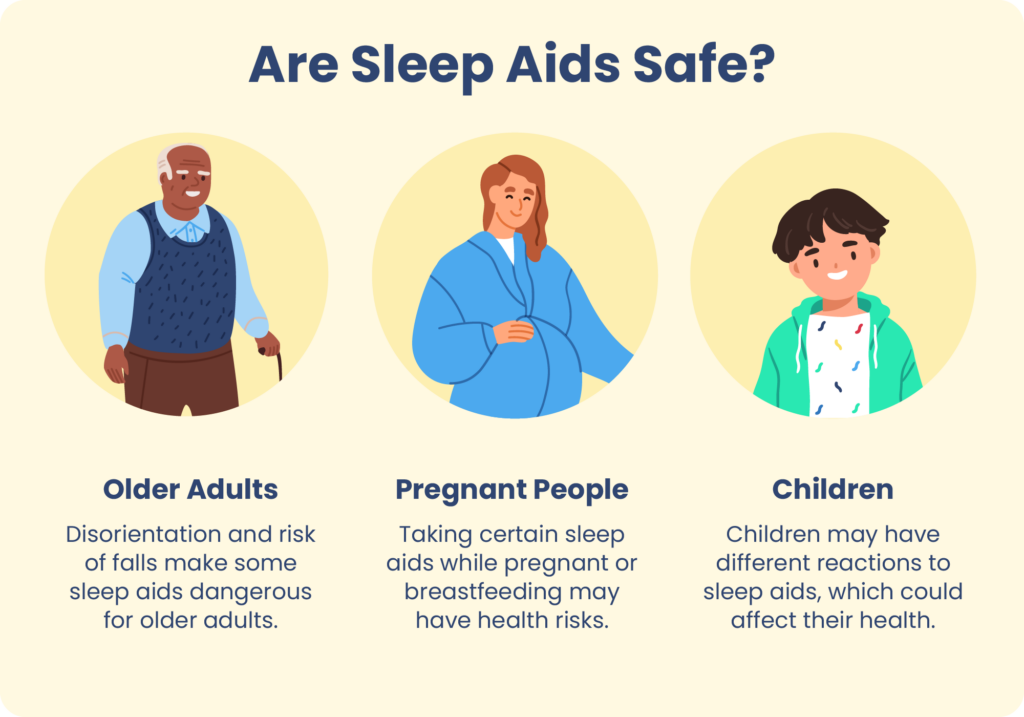
Parents should use caution before giving their child any kind of sleep aid. Most sleep medications are tested primarily in adults, and their safety and effectiveness in children may be unclear. A pediatrician can offer the most tailored advice about the optimal sleep aid for a child’s situation.
How Much Do Sleep Aids Cost?
The cost of sleep aids can vary considerably. For prescription medication, the cost depends on a person’s health insurance coverage and whether a generic version of the drug is available and what pharmacy you go to.
The price of over-the-counter medications and dietary supplements depends on the brand, formulation, and where they are purchased. Shoppers can frequently compare prices online or in different stores.
Taking Sleep Aids Safely
No matter what kind of sleep aid you use, it’s important to take precautions.
- Take the right dose: Only take the prescribed dose at the recommended time. Even if you still struggle to sleep, don’t take another dose during the night unless advised to do so by your doctor.
- Improve sleep hygiene: Focus on sleep hygiene in conjunction with any sleep aids.
- Get a full night’s rest: Make sure you have at least 7 hours to sleep after taking a sleep aid in order to reduce the risk of morning grogginess.
- Plan for short-term use. The risks from sleep medications may increase if they are taken for longer than recommended.
- Don’t mix sleep aids with other substances. Serious problems may arise if sedative sleep aids are mixed with alcohol, other sedatives, or recreational drugs.
- Take sleep aids under the guidance of your doctor. Working with your doctor can prevent unwanted side effects or drug interactions that could affect your health.
Medical Disclaimer: The content on this page should not be taken as medical advice or used as a recommendation for any specific treatment or medication. Always consult your doctor before taking a new medication or changing your current treatment.
References
22 Sources
-
AHFS Patient Medication Information; American Society of Health-System Pharmacists. (2019, November 15). Zolpidem.
https://medlineplus.gov/druginfo/meds/a693025.html -
AHFS Patient Medication Information; American Society of Health-System Pharmacists. (2019, December 15). Eszopiclone.
https://medlineplus.gov/druginfo/meds/a605009.html -
AHFS Patient Medication Information; American Society of Health-System Pharmacists. (2019, December 15). Zaleplon.
https://medlineplus.gov/druginfo/meds/a601251.html -
United States Food and Drug Administration (FDA). (2018, February 13). Questions and Answers: Risk of next-morning impairment after use of insomnia drugs; FDA requires lower recommended doses for certain drugs containing zolpidem (Ambien, Ambien CR, Edluar, and Zolpimist).
https://www.fda.gov/drugs/drug-safety-and-availability/questions-and-answers-risk-next-morning-impairment-after-use-insomnia-drugs-fda-requires-lower -
AHFS Patient Medication Information; American Society of Health-System Pharmacists. (2020, April 15). Suvorexant.
https://medlineplus.gov/druginfo/meds/a614046.html -
AHFS Patient Medication Information; American Society of Health-System Pharmacists. (2020, June 15). Lemborexant.
https://medlineplus.gov/druginfo/meds/a620039.html -
Kärppä, M., Yardley, J., Pinner, K., Filippov, G., Zammit, G., Moline, M., Perdomo, C., Inoue, Y., Ishikawa, K., & Kubota, N. (2020). Long-term efficacy and tolerability of lemborexant compared with placebo in adults with insomnia disorder: results from the phase 3 randomized clinical trial SUNRISE 2. Sleep, 43(9), zsaa123.
https://pubmed.ncbi.nlm.nih.gov/32585700/ -
AHFS Patient Medication Information; American Society of Health-System Pharmacists. (2019, April 15). Ramelteon.
https://medlineplus.gov/druginfo/meds/a605038.html -
AHFS Patient Medication Information; American Society of Health-System Pharmacists. (2020, November 15). Temazepam.
https://medlineplus.gov/druginfo/meds/a684003.html -
AHFS Patient Medication Information; American Society of Health-System Pharmacists. (2020, November 15). Triazolam.
https://medlineplus.gov/druginfo/meds/a684004.html -
AHFS Patient Medication Information; American Society of Health-System Pharmacists. (2020, November 15). Estazolam.
https://medlineplus.gov/druginfo/meds/a691003.html -
U.S. National Library of Medicine. (2020, October 14). LABEL: QUAZEPAM tablet.
https://dailymed.nlm.nih.gov/dailymed/drugInfo.cfm?setid=f7d63f3f-5303-48ab-bce2-35fd62c45799&audience=consumer -
AHFS Patient Medication Information; American Society of Health-System Pharmacists. (2020, November 15). Flurazepam.
https://medlineplus.gov/druginfo/meds/a682051.html -
AHFS Patient Medication Information; American Society of Health-System Pharmacists. (2017, April 15). Trazodone.
https://medlineplus.gov/druginfo/meds/a681038.html -
AHFS Patient Medication Information; American Society of Health-System Pharmacists. (2017, July 15). Amitriptyline.
https://medlineplus.gov/druginfo/meds/a682388.html -
AHFS Patient Medication Information; American Society of Health-System Pharmacists. (2017, December 15). Mirtazapine.
https://medlineplus.gov/druginfo/meds/a697009.html -
Everitt, H., Baldwin, D. S., Stuart, B., Lipinska, G., Mayers, A., Malizia, A. L., Manson, C. C., & Wilson, S. (2018). Antidepressants for insomnia in adults. The Cochrane database of systematic reviews, 5(5), CD010753.
https://pubmed.ncbi.nlm.nih.gov/29761479/ -
AHFS Patient Medication Information; American Society of Health-System Pharmacists. (2017, May 24). Doxepin (Insomnia).
https://medlineplus.gov/druginfo/meds/a617017.html -
U.S. Food and Drug Administration (FDA). (2017, November 13). Prescription drugs and over-the-counter (OTC) drugs: Questions and answers.
https://www.fda.gov/drugs/questions-answers/prescription-drugs-and-over-counter-otc-drugs-questions-and-answers -
AHFS Patient Medication Information; American Society of Health-System Pharmacists. (2018, July 15). Doxylamine.
https://medlineplus.gov/druginfo/meds/a682537.html -
Culpepper, L., & Wingertzahn, M. A. (2015). Over-the-Counter Agents for the Treatment of Occasional Disturbed Sleep or Transient Insomnia: A Systematic Review of Efficacy and Safety. The primary care companion for CNS disorders, 17(6), 10.4088/PCC.15r01798.
https://pubmed.ncbi.nlm.nih.gov/27057416/ -
National Center for Complementary and Integrative Health (NCCIH). (2015, September). Herb-Drug Interactions.
https://www.nccih.nih.gov/health/providers/digest/herb-drug-interactions




